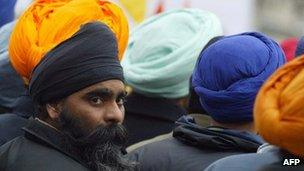UN human rights body backs French Sikhs on turbans
- Published

Sikhs are a tiny minority in France
A Sikh man in France has won the backing of the United Nations Human Rights Committee in his fight over religious headgear.
It said France was violating Sikhs' religious freedom by forcing them to remove their turbans when having photos taken for passports and ID cards.
Ranjit Singh, 76, said he had turned to the UN because he found the French policy disrespectful and unnecessary.
The ruling is not legally binding. France was asked to respond by March.
Mr Singh welcomed the decision, telling the BBC: "[The turban] is part of my body. It is my identity and I cannot part with it."
Long battle
Sikhs in France have been fighting a long battle over the turban.
In 2004 France passed a law banning religious signs in schools. This included turbans and Muslim headscarves.
In the following years, people renewing passports and certain official documents were also asked to remove the religious headgear for photographs.
In the case of driving licences, French regulations said that motorists must appear "bareheaded and facing forward" in their photographs.
But some Sikhs like Ranjit Singh refused to take off their turbans for these official photographs.
As a result, they were refused ID cards and passports.
For Mr Singh it was not a decision he took lightly.
He has been ill for some time and without official ID he was barred from receiving medical treatment and national and local government help and services.
"I cannot get myself treated," he said. "I cannot get X-rays, I cannot get my blood test done, I cannot get admitted to hospital."
He and a fellow Sikh, 55-year-old Shingara Singh, started their fight against the policy in the French courts.
But when they lost their cases, they took the matter to the European courts.
'Patient wait'
In 2008 the European Court of Human Rights dismissed an appeal on grounds of security.
It said that whilst Shingara Singh's religious rights had been infringed, France was justified to ban the turban on the driver's licence photo because the turban posed a security risk of fraud and falsification.
That is when Ranjit Singh decided to file a case to the UN Human Rights Committee (UNHRC). It has now judged that a turban does not pose a risk to security.
In its judgement, external, reached in July but only now revealed, the UNHRC said: "Even if the obligation to remove the turban for the identity photograph might be described as a one-time requirement, it would potentially interfere with the author's (Ranjit Singh's) freedom of religion on a continuing basis."
The committee also said that France had failed to explain how the Sikh turban hindered identification since the wearer's face would be visible and he would be wearing it at all times.
Therefore, it argued, the regulation constituted a violation of Article 18 of the International Covenant on Civil and Political Rights.
"I had faith that truth and justice would prevail and I patiently waited for this day," said Ranjit Singh.
"I pray that France will now fulfil its obligation and grant me a residence card bearing my photo without baring my head."
Mejinderpal Kaur of United Sikhs, which backed Mr Singh's case, said: "We now look to France to fulfil its treaty obligations under international law and its moral duty to ensure that the freedom of religion and belief is upheld for everyone who lives within its territory."
The news was welcomed by Sikhs around the world.
Mrs Praneet Kaur, Indian minister of state for external affairs, said she was "very happy with the UN's decision and... for making everyone realise what the turban means to Sikhs".
- Published19 May 2010